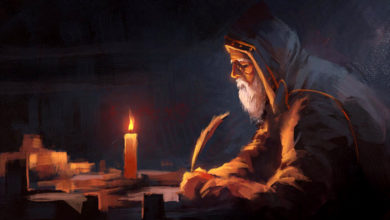Artisans Kings Priests Sages Scholars Servers Warriors
The Sage Role
Traits | Description | Purpose | Compatibility
+ Expression
– Oration 10% of the
population Expression
Cardinal
Positive Traits: Articulate, Colorful, Dramatic, Entertaining, Enthralling, Expressive, Friendly, Fun-loving, Humorous, Informative, Inquisitive, Knowledgeable, Light-hearted, Perceptive, Storyteller, Verbose, Wise
Negative Traits: Arrogant, Bag of Wind, Deceptive, Demands Attention, Drama Queen, Egocentric, Gossipy, Hogs Conversations, Intrusive, Loud, Oratorical, Overblown Sense of Entitlement, Sleazy, Tactless Bore, Tasteless

Like the Artisan, the Sage role is also one of Expression. In this case, the expression is usually intangible, in contrast to the Artisan. Sages are typically involved in expressing themselves through such intangibles as words: verbally in teaching or public speaking; or in movement: dancing and acting. Sages are, metaphorically speaking, the face of the body of mankind. They give expression to the higher mental activities of society with such offerings as philosophy, theater, and the arts. As the face of mankind, Sages give voice to the thoughts of the culture. They show in their countenance what is going on in the consciousness of society. Sages have a need to express themselves before the public at large.
Acting, dancing, and entertaining are some of the occupations where Sages find fulfillment for this need to express themselves — anything that has to do with performing on stage or before a camera. This type of thing is especially suitable for Sages in the Positive Pole of Expression. They enjoy the movement, the display, the spectacle, the representation, and the exhibition of the histrionic art. Many Sages find satisfying careers in teaching, reporting, public speaking, and newscasting — anything that has to do with getting a message out to the public. This type of thing is especially suitable for Sages in the Negative Pole of Oration.
They enjoy hearing themselves talk, and the words flow so easily from their mouths, that this type of activity comes very naturally to them. They have the “gift of gab”. Many Sages also get into politics these days, since politics has become such a media event, with leaders always before the camera and in the press. This fulfills the Sage’s need to be in the public eye. Sages have wisdom, they look good, and they speak well. Thus they are able to appeal to a large segment of the public, and thereby get elected. In historical times, Sages were such things as bards, minstrels, and storytellers. In whatever occupation Sages find themselves, they apply a measure of artistry and aesthetics to it.
Sages want the eyes of the world to be focused upon them. They love to be the center of attention, and to be in the limelight. Like a person with the Goal of Acceptance, Sages want to be pleasant and easy to get along with. They are typically very charming and cooperative. They desire to be suave, polished, classy, and graceful in their behavior. Like a person in the Power Mode, Sages are normally self-confident in their behavior, and proceed as if they “had their act together.” Like a person with the Feature of Greed, Sages can be very much into loving themselves. They want everything coming in to them, and nothing going out.
They often use, exploit, and manipulate other people in order to get what they want. In a manner of speaking, Sages view themselves as the center of the universe. That is, they are very subjective about everything — they consider how events in their lives relate to themselves personally: “What does this mean to me? How does this affect me?” Like an Idealist, Sages typically have an innocent, utopian, high-minded attitude toward life. They are friendly and gregarious — everybody is their brother. They feel at home in a crowd, and are always learning, absorbing, and taking in thoughts and ideas from the environment. Sages soak up knowledge like sponges — they usually read a lot. Sages are typically philosophical minded, concerned with the higher meaning of things in their lives. They want to see the pattern of life, and get the big picture. Wisdom is generally the province of Sages.
It is often said of Sages that they are “dingey”. They have some trouble with physical reality because their minds and thoughts are usually in the abstract, artistic or philosophical realms. At an extreme, Sages tend to live in their own dreamy fantasy world. Sages often fall prey to their own imaginations, and are victims of their own delusions. They have a hard time facing reality. They are prone to think that the real world works like their imaginary world. Obviously this can get them into trouble when this proves not to be the case. It is wise for Sages to find people who are more down to earth (for instance, Artisans) to take care of the everyday affairs of life so that they can devote themselves to their artistic or fantasy lives, or to their philosophical musings about the abstract meaning of things.
A Sage in performanceThis factor shows up very much in the profession in which Sages are commonly involved — acting. Sages come up with ideas for stories with profound meaning. And then they play the starring roles in the radio, movie, or television productions of these stories. But it takes persons with technical know-how to make them happen, to bring the stories into the real, tangible world — lights, cameras, stage scenery, special effects: the “nuts and bolts” of the production. This is where Artisans come in. It takes the Sage/Artisan Complementary team to complete the Expression Dimension.
Sages view the world as a stage and themselves as actors. They are attuned to the dramatic and theatrical elements of life. Even if they are not involved in a career of acting, Sages are natural-born actors. They love to “ham it up” before an audience. Sages regard other people as their audience, before whom it is their privilege to perform continually. Some might think that to put on a show for others is being phony, because acting is not real. But Sages really find their fulfillment in acting — this is their sincerity and their integrity. Sages are naturally good at imitating, impersonating, and mimicking other people. They easily take on, assume, and absorb the traits of other people, then express these traits back out to the world in their performances.
A Flair For Drama
Because Sages interpret life in terms of drama, they often lead lives that are suitable material for a soap opera. After all, they want to live a good story, not just tell a good story. In their personal lives, they play out all the great issues: power and weakness, comedy and tragedy, romance and loneliness, courage and cowardice, success and failure, and so on. Life is not meaningful to them unless they are playing out these various grand dramas.
Sages are very much concerned with how they look to others. How they appear to strangers is very important to them. They rarely go out in public without fixing up and dressing up. They are naturally photogenic — they look good in pictures and on camera. If there is a physical appearance that is common to many Sages, it is that they are pleasing, attractive, distinctive, and attention-getting.
The most distinguished, beautiful, and handsome people are likely Sages, because of their concern for self-image. Image, rather than substance, is their interest. The Hollywood glitz, glitter and glamour scene is the ultimate expression of this. This superficial and surface approach to life can be difficult for many Sages to overcome. Sages have a lot of depth of wisdom, if only they do not dress it up too much with a story that just sounds good or a picture that simply looks good. Sages emphasize the cover of the book rather than the book itself. Themselves may “judge the book by its cover”, and thus be fooled by unscrupulous individuals with smooth tongues and honest appearances.
This brings us to another factor regarding Sages. Sages are usually rather shrewd and clever, being concerned as they are with wisdom. But they can turn this to the abuse of others because of their selfishness. In their worst manifestation, Sages tend to think the world owes them a living just because they are attractive and charming. They expect others to give them gifts of appreciation, to throw money at their feet for a great performance. For this reason, Sages may think that they are justified in taking advantage of other people.
They think fools are fair game if they can talk them out of their money. Sages can often make a living off of swindling and bilking alone. As consummate actors, Sages are the archetypal “con artists”. By looking good and sounding good, they dupe gullible people into buying into their get-rich-quick schemes. Even if they are not dishonest, Sages still think they can talk their way into or out of anything. They can be glib and loquacious, especially if they are in the Negative Pole of Oration. They are inclined to believe that just saying it makes it so, without having to do any real work to make it so.
Another problem with Sages is that they are so needful of attention for themselves that they are not always capable of giving attention to others. Sages are inwardly focused, and very much aware of themselves and their own needs and desires. They are so wrapped up in, and so much of their energy is spent in, their own life drama, that they do not have the time or energy for others. Also, since they are so public-at-large oriented, they find it difficult to concentrate their attention on individuals who may be desirous of their help or attention. In other words, Sages tend to spread themselves too thin to be of much assistance to just one person.
There have been quite a number of famous Sages. And with good reason. Sages seek fame. They want to be known — the more to whom their name and face is know the more successful the Sage regards himself. Some famous Sages who fulfilled their Role very well are:
— Phil Wittmeyer
More About The Sage
Sages are the wordsmiths of the world. They are the great communicators, and masters of verbal expression that in a characteristically fun-loving way, awaken us to the possibility of insight and wisdom. In fact, it’s been humorously suggested that the Sage must not only have the last word, but the last 50,000. There may be some truth in such levity, but as we shall learn, there is much more to the Sage than just the proverbial bag of wind.
The Sage is truly gifted at collecting and disseminating unique information that can make a difference in our lives. Natural performers, they have the remarkable ability to capture our attention and simultaneously entertain us while they tickle our minds with valuable knowledge. Such gifts make them superb teachers, and their unparalleled skills at communication help them realize success as actors, authors, and speakers. Sages also have a natural affinity for humor, and can be outstanding comedians, with a special flair for the outrageous and the absurd.
If there is a common thread that links most Sages, it might be their natural inclination to teach. Although wise and perceptive, a Sage’s brand of teaching need not be formal or suffer from the stale reek of academia. Important lessons can be taught through the use of satire, humor, or playful banter. As educators, Sages will sometimes delude themselves into believing everything they say is true, but if they simply remember to use the default wiring that allows them to touch life lightly, they can be the greatest of teachers.
Sages can also excel at bending the truth. In their darker mode, they can be masters of deceit, manipulating and distorting the facts to suit their own self interests. Used car salesmen come to mind, or those oily $500 an hour lawyers we just love to hate.
Humorously, in the negative pole of Oration, Sages can be like human flycatchers, with mouths perpetually open as they pummel their victims with an endless barrage of tornado-like verbiage. The path of destruction left during the wake of such Sage-inspired word rubble rarely leaves room for a rebuttal. Thus, it appears an unwritten law in the Universe might be: Never argue with a Sage!
As revealed, Sages can be great “drama queens.” Loving to be the center of attention, Sages have been known to occasionally throw tantrums with the histrionic intensity reminiscent of a Messiah being nailed to a cross. Apparently the consummate acting talents of the Sage can not be denied, and this can be one of the greatest challenges for them: Sages tend to metaphorically live life on stage, performing and basking in the applause from their audience rather than living with an intention to communicate and make connections with others. This strong need for being in the public eye can sometimes be their shortcoming when it comes to addressing the needs of others; sometimes Sages are just too wrapped up in their own soap operas.
Despite these shortcomings, Sages are just plain fun, and they never cease to amaze us with their taste for aesthetics and the artistic sensibilities they bring to all endeavors. With their sparkling wit, theatrical flair, and a seemingly endless reservoir of fascinating stories, Sages can entertain those around them for hours on end. Colorful, scintillating, expressive, charming, perceptive, dynamic, and rarely boring, Sages stand out in the crowd. Whether they choose to be outrageous or informative, the Sage is an insightful emissary of the human condition, masterfully bridging playfulness with wisdom. They may try to claim center stage, but then again, the Sage has something to say.
— David Gregg
Compatibility With Other Roles
Sage-Server: Servers and sages can work quite well as long as the servers are not too much “by-the-book” kinds of people; some servers are, and sages do not tend to be—they like to play with the book, to stretch and expand it, rather than adhere strictly to any sort of pattern. (Sage is the five-position role, and the number five has a positive pole of expansion (positive pole of number five.) Servers who are bureaucratic, who see going by the book as what is best for the common good, tend to irritate sages to no end—and vice versa.
However, if the servers are not doing their negative pole in that way, this is generally a good combination, because servers tend to be quite willing to let sages have the spotlight. Artisans, who also work well with sages, may or may not be willing to do that—they may just go off and do something else. They will not tend to try to stop sages from being in the spotlight, but servers are more likely to really listen and be supportive, fully receiving the expression (positive pole of sage) of sages. Sages can be very grateful for that. Also, sages are often heart people. They may be quite intellectual and verbal, but they rarely become nearly as emotionally dry as scholars can be. Servers in their positive pole can epitomize the good heart, so servers and sages can love each other very deeply, in some ways more than servers and priests, because both servers and priests tend to stay busy taking care of other people. Servers might nurture priests, but priests might be out taking care of three hundred other people. Although sages might be entertaining three hundred other people, that is not as involving as the caretaking that priests engage in.
Sage-Artisan: Sages can be anchoring for artisans, and they can have much joy together. Sages are often able to cultivate the humor in artisans, so that they are truly playmates. Sages can make it safe for artisans to be more childlike, whereas artisans may not feel that this is permitted with the other roles, even with other artisans—artisans may feel that they have to try to be more adult, because the relationship does not feel very well anchored. Sages, however, usually have a pretty good grasp on external realities, since they are the ones who interconnect and communicate with everyone. So with sages, artisans can feel anchored but at the same time have the ability to express themselves. Sometimes sages push artisans to bring their creations (positive pole of artisan)” before the public eye. That can be quite useful for artisans, but it may also bring up fear, since artisans are generally not as sturdy and do not feel that they hold up well in the public eye. So there can be a bit of a push-pull here. There is the need to put forth the artisans’ works, but if sages push artisans too much, there may be too much fear coming out at once for artisans to deal with it constructively.
Sage-Warrior: Sage-warrior is a good combination because there is the ability to laugh together, but whereas sages can procrastinate and play, warriors tend to exert pressure to get down to business as well. Warriors can play, but after the time for that has passed, warriors are ready to move on. So this is balancing. Also, warriors are not generally very good at articulating, although there are exceptions to this—centering plays a part—and, of course, sages are expert at this, so sages can help warriors with their communication. Warriors sometimes feel that sages understand them well because warriors do not have to say everything—sages can intuit some of it, and warriors very much appreciate that. All the same, sages can put pressure on warriors to at least try to verbalize their feelings, because sages want to hear the words—the words are their validation—even if they already know, even if they are getting the communication nonverbally, which they often do.
Sage-Scholar: Sage and scholar is also a good combination. Both love knowledge (positive pole of scholar) and information. Scholars are sometimes envious of sages, because scholars tend to fear that they are not as “spicy,” as interesting, as the other roles, and there is no role more potentially spicy than sages. (Sages feel that they have to be, in order to get everyone’s attention.) The fact of the matter is that scholars are usually genuinely content not being in the limelight—being wallflowers, even—but your society rewards sages with acclaim much more often. If scholars feel a lack of self-esteem, they can be envious of sages. I’ve noticed that scholars can easily find sages irritating because scholars want knowledge (positive pole of scholar) to be just caretaken: neutral and available. Sages, on the other hand, often want to elaborate on it or exaggerate it.
Scholars distrust that, feeling that there’s some distortion or ego in it. A spice in your food can taste good in the right quantity, but can irritate if there’s too much of it. Sages often feel the urge to exaggerate when they are fulfilling their role of storyteller. The story has to be made interesting, larger than life. Most people find movies, for example, that present stories faithfully—in life-size projections rather than larger-than-life—to be boring. They have to be magnified somehow. But sages can get carried away with this—just as any role can get carried away with whatever it is doing—and not respect boundaries. This can also be a factor in starting and expanding rumors. There is a certain amount of heightening of reality that reality can tolerate without being distorted. In great art, reality may, in fact, be clarified by being heightened, by being put under a magnifying glass.
That is really what sages are trying to do. However, if they lack skill or insight, they may distort it, which puts them in their negative pole, oration (negative pole of sage). Scholars are more concerned about the purity of information, but they are not more dedicated to truth than sages. Scholars tend to see truth as fact; sages tend to see truth as what reveals the moral or insight of the story, since story is a big part of what sages are about. Sages in the negative pole can be irritating to everyone, but we would not overemphasize the conflict between sages and scholars; generally, they are quite complementary. Scholars like how forthcoming sages are in providing information. Sages do not see it as an inconvenience, as a warrior, for example, might, if he’s trying to get on to doing the next thing. Sages know that disseminating information is their job, their role.
And sages see scholars as possible sources of “news they can use,” although the way scholars operate is to take a big chunk of raw data and slowly distill it; if scholars give their knowledge (positive pole of scholar) before it has been well distilled, it can be more than is needed or can be used. Scholars are willing to provide data at any stage in the distillation process, because it is all interesting to them, but the other roles generally just want the end result: the fully distilled version, the conclusions, the bottom line. That would also be why scholars like each other so much. Right—there is mutual appreciation of the whole process. Sages, being an expression role, do not hesitate to express to scholars just what information they want or do not want.
If they do this without tact, that can be offensive to scholars. Sages are usually pretty tactful, but sages who have a warrior essence twin or warrior casting, for example, may be more blunt. Sages, warriors, and scholars all tend to have particularly well-developed senses of humor; so sages are another role that scholars can play with. However, scholars are prone to the kind of puns and word play sometimes called “groaners,” and sages may tease scholars about this. Underneath, sages usually enjoy the word play or pun anyway. Sages do not really look down their noses at it (even though they may pretend to) because they appreciate all kinds of humor, even those that are not their own kind. If the humor is particularly complex or clever, sages may feel admiration and respect—even if it is not, in fact, all that funny. Wherever there is a demonstration of expressive ability, sages will acknowledge that on some level. Scholars can be particularly humorous in their writing—often in a tongue-in-cheek way.
Their humor is not as dramatic as that of sages, but it can be pleasant to read. Sages’ humor tends to be more broad and accessible, and being expressive, it tends to work better in performance than scholars’ humor. Scholars are not very often good at stand-up comedy, for example. They are just not expressive enough—unless they have a sage essence twin, or another expressive influence—to deliver their thoughts with enough spice.
On paper it does not matter—the humor is all in the words themselves, and no role is more expert with words per se than scholars. What about sages’ ability with words? Scholars are generally the most facile in vocabulary and the intrinsic use of words—what words go where—whereas sages are more clever in manipulating words and playing with their meanings, as with innuendo. The scholarly puns and word games are more about the structure of words themselves than about playing with their meaning, as sages are more prone to do. Sages, of course, can also be funny on paper with words, but scholars can be endless in their ability to mine the gold in words themselves.
Sage-Sage: The only trouble spot between two sages is that both tend to be reluctant to yield the floor to the other. So if the sages involved have learned to be good listeners as well as good talkers—which is not very common—that problem is minimized. Sages can feel relieved to be in the presence of other sages who want to play, laugh, and joke, and who “get” and appreciate their jokes, especially if their sense of humor is a little off-the-wall. Sages’ sense of humor that is meant for the mainstream, which includes all the roles, is more, you could say, commercial; sages tend to save their more eccentric or leading-edge humor for other sages and maybe artisans who will get it.
Warriors and scholars also tend to appreciate sages’ sense of humor, but do not always plug in to it in the same way. Sages, then, can have much fun with each other. They can have long talks that may be in either their positive or negative pole, but often they have a sense of accomplishment through these conversations, and just the good feeling of being heard and received when each has enough time to share all he wishes to. On the other hand, these relationships can be shallow: if sages perform for each other instead of genuinely relating, there is not too much “glue” holding these relationships together or a sense of balance in them.
Sage-Priest: This combination can be problematic, or it can be quite good. The problem would be competition, trying to get the attention of the same congregation/audience. Since both are exalted (cardinal), and both often like to talk a great deal, it can be difficult for either role to feel that they are fully being received. And, in some ways, they tend to not understand each other very well. On the other hand, they can get along quite well for a similar reason to the reason two scholars may get along—they may feel like colleagues; they may complement each other. Sages are an expression role, but may feel a secondary impulse to inspire as well.
So, for example, sage actors might want their performance not only to be technically good and to communicate what the author intended, but also to be inspiring, uplifting, and enlightening. Sages may see that as leaving the audience with more insight or understanding. Priests may see inspiration as more purely an emotional feeling of upliftment and dedication. However, these two approaches are not at cross purposes, and sages and priests can work together as a team. So if they are mature enough to give each other an opportunity to be fully received, the relationship can work quite well, but this combination can take more work than many of the others.
Sage-King: Sages and kings can also get along very well. They do not tend to compete, as you might think they would. Sages can successfully convince kings to let down their hair and not be “on duty” all the time, although even then, even when recreating, kings do not tend to go off duty completely. Also, sages love to advise kings, to give information. However, if kings are in their negative pole, tyranny (negative pole of king), it can quickly bring sages into their negative pole, oration (negative pole of sage), because in tyranny kings are not really listening to sages’ advice. Then sages may start to bluster in order to try to make kings listen, to try to get through.
Also, sages, like artisans, like to live a little bit by the seat of their pants; they do not like to toe the line. So if kings become bossy, there can be some big fights between kings and sages. I think of the archetype of the court jester and king—it could be quite volatile and fraught with drama. Right. Since sages are a cardinal role, they can generally hold their own with kings, unless they have a goal of submission, or goal of acceptance, which makes it harder for sages to fight. This combination works best when kings’ overleaves are relatively soft. But sages generally do not mind fighting with kings, and kings may secretly admire the sages’ repartee. Kings may feel that they can learn something from sages’ retorts or insights.
— Shepherd Hoodwin
From “The Journey of Your Soul”
Famous Sages:
Bella Abzug, Jennifer Aniston, Leonard Bernstein, Jack Black, Lenny Bruce, Kate Bush, Michael Caine, Jim Carrey, Miguel Cervantes, Bill Clinton, George Clooney, Stephen Colbert, Toni Collette, Tom Cruise, Jeff Daniels, Cameron Diaz, Alexander Dumas, Duke Ellington, William Faulkner, Albert Finney, David Frost, Janeane Garofalo, George Gershwin, Angelina Jolie, Stephen King, Keira Knightley, Jay Leno, Shirley MacLaine, Eddie Murphy, Carolyn Myss, Jack Nicholson, Luciano Pavarotti, Matthew Perry, Carl Sagan, Peter Sellers, Howard Stern, Tom Wilkinson, Marianne Williamson, Oprah Winfrey





